Table of Contents
Thinking about getting inked? Tattoos are more than just cool designs; they're personal stories etched onto your skin. The world of tattoo designs and meanings is vast and fascinating, filled with symbols, cultural influences, and artistic expressions that can reflect your journey, values, and aspirations. But with so many options, how do you choose a design that truly resonates with you? This guide is your compass, navigating you through the popular symbols, animal motifs, and abstract art that adorn bodies worldwide. We'll dive into the symbolic language of tattoos, from the fierce loyalty represented by a wolf to the delicate beauty embodied by a lotus flower. You'll discover how cultural traditions shape tattoo artistry and learn to decode the hidden messages within various designs. Whether you're drawn to the timeless appeal of a nautical star or the modern edge of geometric patterns, understanding the meanings behind these images will empower you to select a tattoo that is not only visually stunning but also deeply personal. So, get ready to explore the vibrant world of tattoo designs and meanings and find the perfect ink to tell your unique story.
Animal Tattoo Designs and Their Symbolic Meanings
Animal Tattoo Designs and Their Symbolic Meanings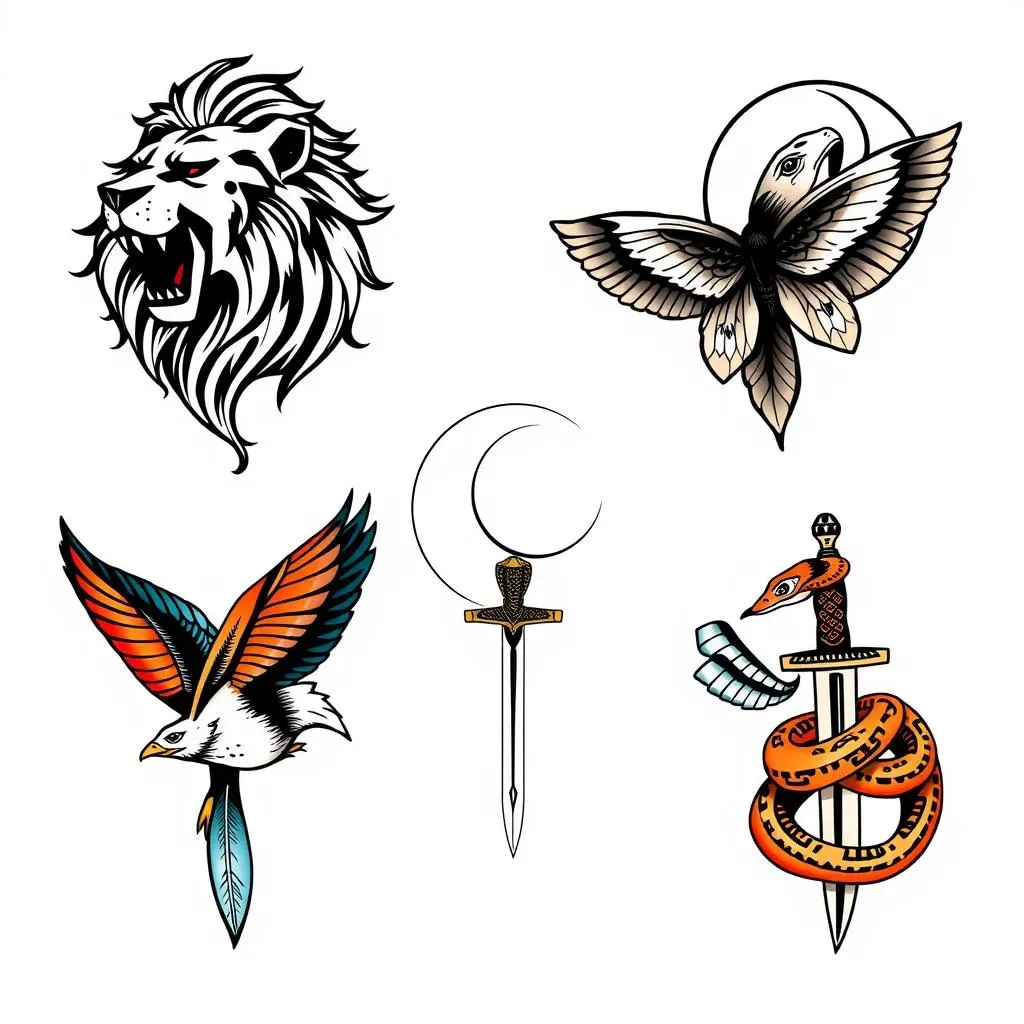
The Mighty Lion: Courage and Leadership
Animal tattoos are a classic choice, and for good reason. They're powerful symbols that can represent different aspects of your personality or the qualities you admire. Take the lion, for instance. This majestic creature is often associated with courage, strength, and leadership. Getting a lion tattoo can be a way to embody these traits in your own life. It's like wearing your inner king or queen on your sleeve – or wherever you choose to get it inked!
However, the lion can also symbolize pride, royalty, and even aggression. So, when considering a lion tattoo, think about what aspects of the lion's character you want to emphasize. A roaring lion might represent fierce determination, while a calm, watchful lion could symbolize wisdom and authority. Context matters, even in the world of tattoos!
The Graceful Butterfly: Transformation and Hope
On the other end of the spectrum, we have the butterfly. Far from the lion's roar, the butterfly whispers of transformation, hope, and new beginnings. Its journey from a humble caterpillar to a beautiful winged creature is a powerful metaphor for personal growth and overcoming challenges. A butterfly tattoo can be a reminder that even in the darkest of times, change is possible, and beauty can emerge from struggle.
The butterfly's delicate nature also makes it a symbol of fragility and the fleeting nature of life. Different colors can add another layer of meaning. For example, a blue butterfly might represent peace and tranquility, while a yellow butterfly could symbolize joy and optimism. It's a popular choice, especially for those who have gone through significant life changes or want to celebrate their personal evolution.
Animal | Symbolism |
|---|---|
Wolf | Loyalty, Family, Instinct |
Eagle | Freedom, Vision, Power |
Snake | Transformation, Healing, Temptation |
Owl | Wisdom, Mystery, Intuition |
The Loyal Wolf: Family and Instinct
Wolves are often misunderstood creatures, but in the tattoo world, they typically represent loyalty, family, and strong instincts. A wolf tattoo can be a tribute to your pack – your family, your close friends, or anyone you consider your tribe. It can also symbolize your connection to your own intuition and the importance of listening to your gut feelings. Wolves are fiercely protective of their own, making this a powerful symbol of devotion and guardianship.
However, it's worth noting that wolves can also be seen as symbols of wildness and independence. A lone wolf tattoo might represent someone who values their freedom and prefers to forge their own path. Ultimately, the meaning of a wolf tattoo depends on the individual and the specific design they choose. Are they howling at the moon, running with the pack, or standing solitary on a snowy peak? The details tell the story.
Exploring the Meanings Behind Popular Symbol Tattoo Designs
Exploring the Meanings Behind Popular Symbol Tattoo Designs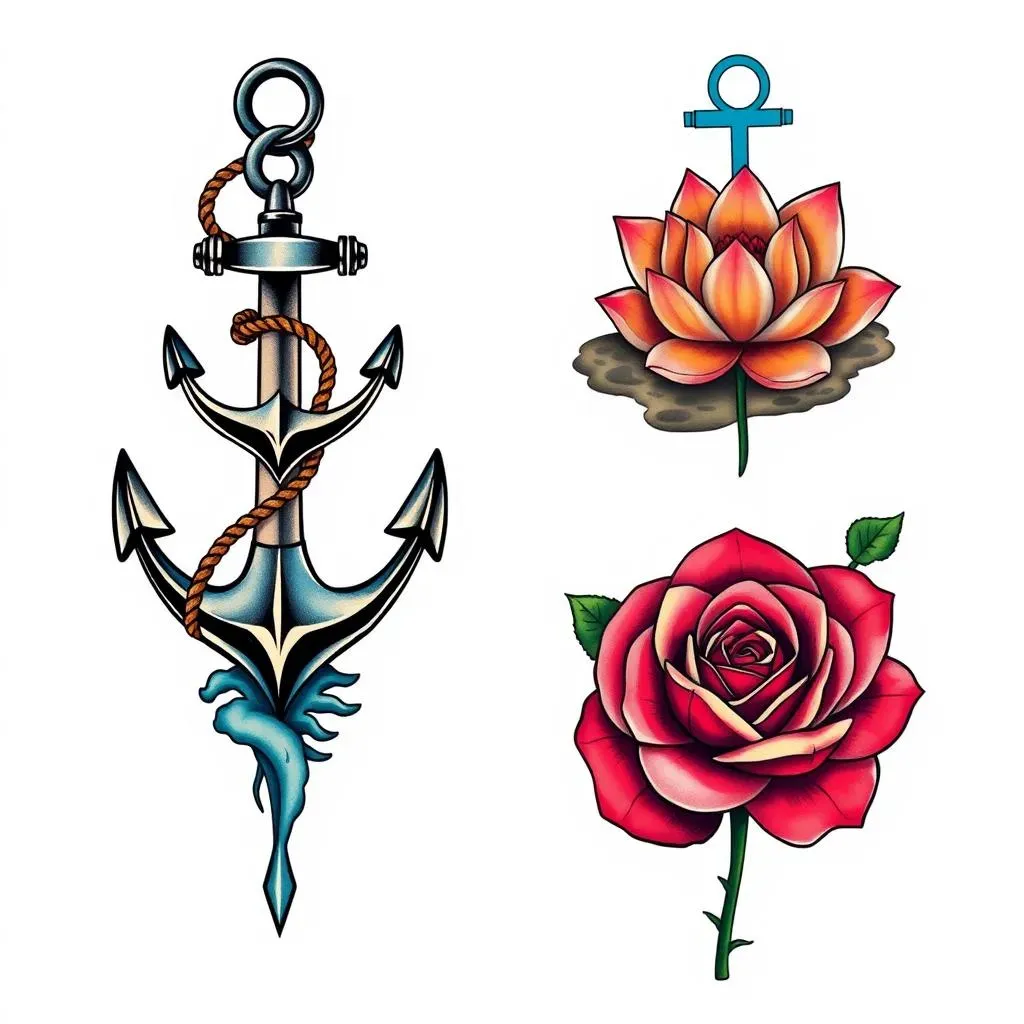
The Enduring Anchor: Stability and Hope
Alright, let's dive into symbols! You know, those classic images that have been inked on bodies for ages. First up, the anchor. This isn't just for sailors anymore. An anchor tattoo is a powerful symbol of stability, hope, and grounding. Think about it: an anchor keeps a ship steady in the roughest storms. For many, it represents staying strong and centered, no matter what life throws your way. It's a reminder to stay grounded and true to yourself, even when the seas get choppy.
Historically, the anchor has strong ties to seafaring traditions, representing a safe return home. But its meaning has expanded beyond the maritime world. It can also symbolize hope in the face of adversity, a steadfast belief that things will get better. The anchor's simple yet powerful design makes it a timeless choice, carrying a message of resilience and unwavering faith.
The Mystical Lotus: Purity and Rebirth
Next, we have the lotus flower. This beauty isn't just a pretty bloom; it's packed with meaning. The lotus grows in muddy water, yet it emerges pure and pristine. Because of this, it symbolizes purity, enlightenment, and rebirth. It's a reminder that even from the muddiest situations, you can rise above and blossom into something beautiful. It's a popular choice for those who have overcome challenges or are seeking spiritual growth.
In various cultures, the lotus also represents different aspects of life. In Buddhism, it's associated with spiritual awakening and detachment from worldly desires. In Hinduism, it symbolizes beauty, prosperity, and fertility. The color of the lotus can also add another layer of meaning. A white lotus represents purity and perfection, while a pink lotus is associated with the Buddha himself. Whether you're seeking enlightenment or simply appreciate its elegant beauty, the lotus is a symbol that resonates deeply.
The Timeless Rose: Love and Beauty
Ah, the rose. Can't go wrong with this classic, right? But there's more to it than just a pretty flower. The rose is a universal symbol of love, beauty, and passion. But, like any good symbol, the details matter. A red rose typically represents romantic love and desire, while a white rose can symbolize purity and innocence. A yellow rose might signify friendship, while a black rose often represents mourning or loss. Even the presence (or absence) of thorns can change the meaning. Thorns can represent sacrifice, pain, or a warning.
The rose is a timeless choice that can be adapted to suit different styles and preferences. Whether it's a delicate watercolor rose or a bold traditional tattoo, this flower carries a message of enduring beauty and emotion. It's a reminder to appreciate the beauty in life, even amidst the thorns.
Symbol | Meaning |
|---|---|
Heart | Love, Passion, Affection |
Star | Hope, Guidance, Inspiration |
Cross | Faith, Spirituality, Sacrifice |
Infinity Symbol | Eternity, Limitlessness, Everlasting Love |
Unique and Abstract Tattoo Designs: Interpretations and Significance
Unique and Abstract Tattoo Designs: Interpretations and Significance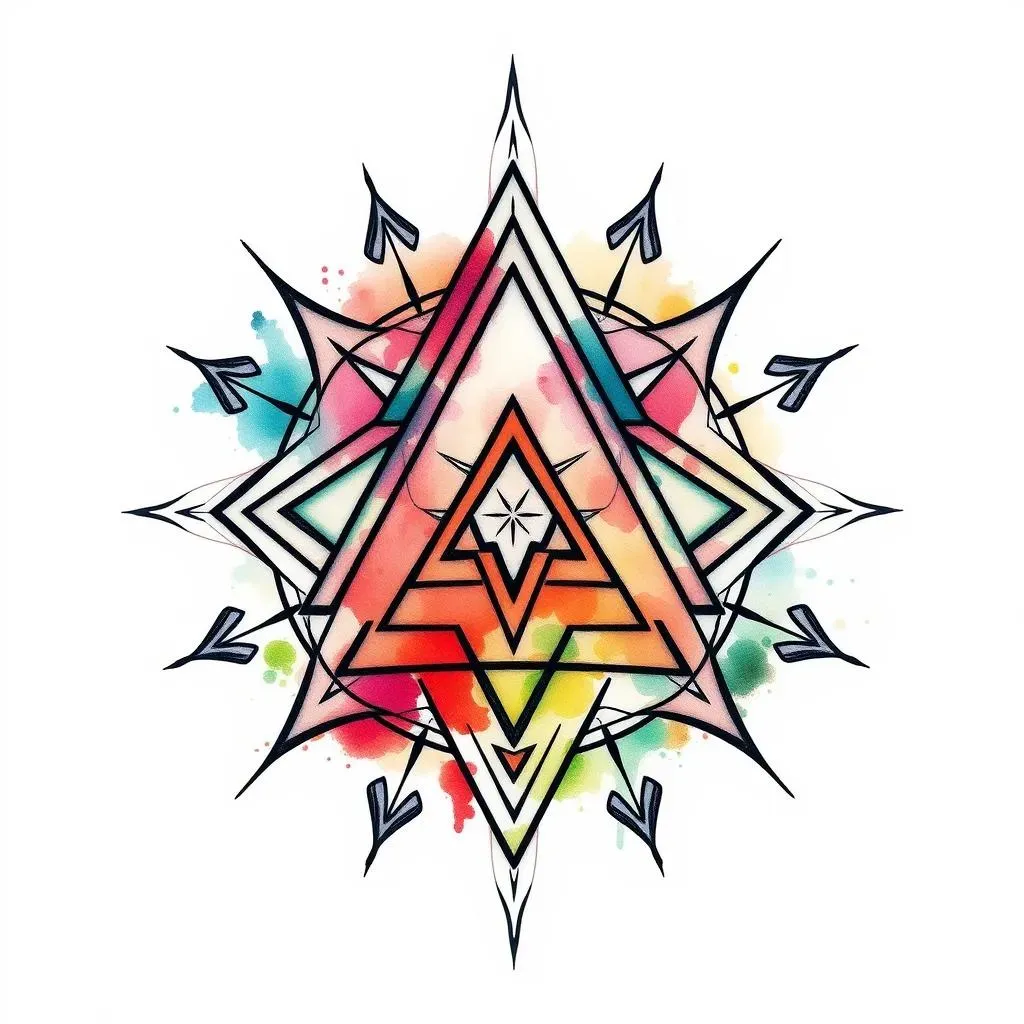
Geometric Patterns: Order and Harmony
Alright, let's get a little more out there! Forget the traditional stuff for a minute and let's talk abstract. Geometric tattoos are super popular right now, and for good reason. They're clean, modern, and can hold a ton of meaning. Think about it: a perfectly balanced mandala can represent harmony and the cosmos, while a series of interconnected triangles might symbolize strength and stability. It's all about finding order in chaos, and these designs do it beautifully.
But the beauty of geometric tattoos is that they're open to interpretation. There's no one "right" meaning, which means you can imbue them with your own personal significance. Maybe a specific shape resonates with you, or perhaps you're drawn to the way certain patterns create a sense of movement. The possibilities are endless, and that's what makes them so cool. Plus, they look amazing!
Watercolor Tattoos: Fluidity and Emotion
If geometric isn't your thing, how about watercolor tattoos? These are like wearable paintings, blurring the lines between art and ink. Watercolor tattoos are known for their soft, dreamy aesthetic, often mimicking the look of actual watercolor paintings. They're all about fluidity, emotion, and letting go of rigid structures. Imagine a splash of vibrant colors swirling across your skin – it's a beautiful way to express your emotions and embrace the unpredictable nature of life.
However, watercolor tattoos can be a bit tricky. Because the ink is often diluted to create that soft effect, they may fade faster than traditional tattoos. It's crucial to find an experienced artist who specializes in this style to ensure your tattoo stays vibrant for years to come. But if you're willing to put in the extra care, a watercolor tattoo can be a stunning and deeply personal piece of art.
Abstract Shapes and Lines: Personal Expression
Beyond geometric patterns and watercolor effects, there's a whole world of abstract shapes and lines to explore. These tattoos are all about personal expression, allowing you to create a design that is completely unique to you. Maybe you're drawn to the simplicity of a single line, or perhaps you prefer a complex arrangement of shapes and textures. The key is to choose elements that resonate with you and tell your story.
Abstract tattoos can be incredibly meaningful, even if their symbolism isn't immediately apparent to others. They can represent your inner world, your dreams, or your connection to the universe. The beauty of abstract art is that it invites interpretation, allowing viewers to project their own meanings onto the work. So, if you're looking for a tattoo that is both visually striking and deeply personal, consider venturing into the realm of abstract design.
Style | Characteristics | Meaning |
|---|---|---|
Geometric | Precise shapes, patterns | Order, balance, harmony |
Watercolor | Fluid, dreamy, soft colors | Emotion, creativity, freedom |
Abstract | Non-representational, unique | Personal expression, individuality |
Line art | Minimalist, single lines | Simplicity, elegance, connection |
Cultural Influences on Tattoo Designs and Their Meanings
Cultural Influences on Tattoo Designs and Their Meanings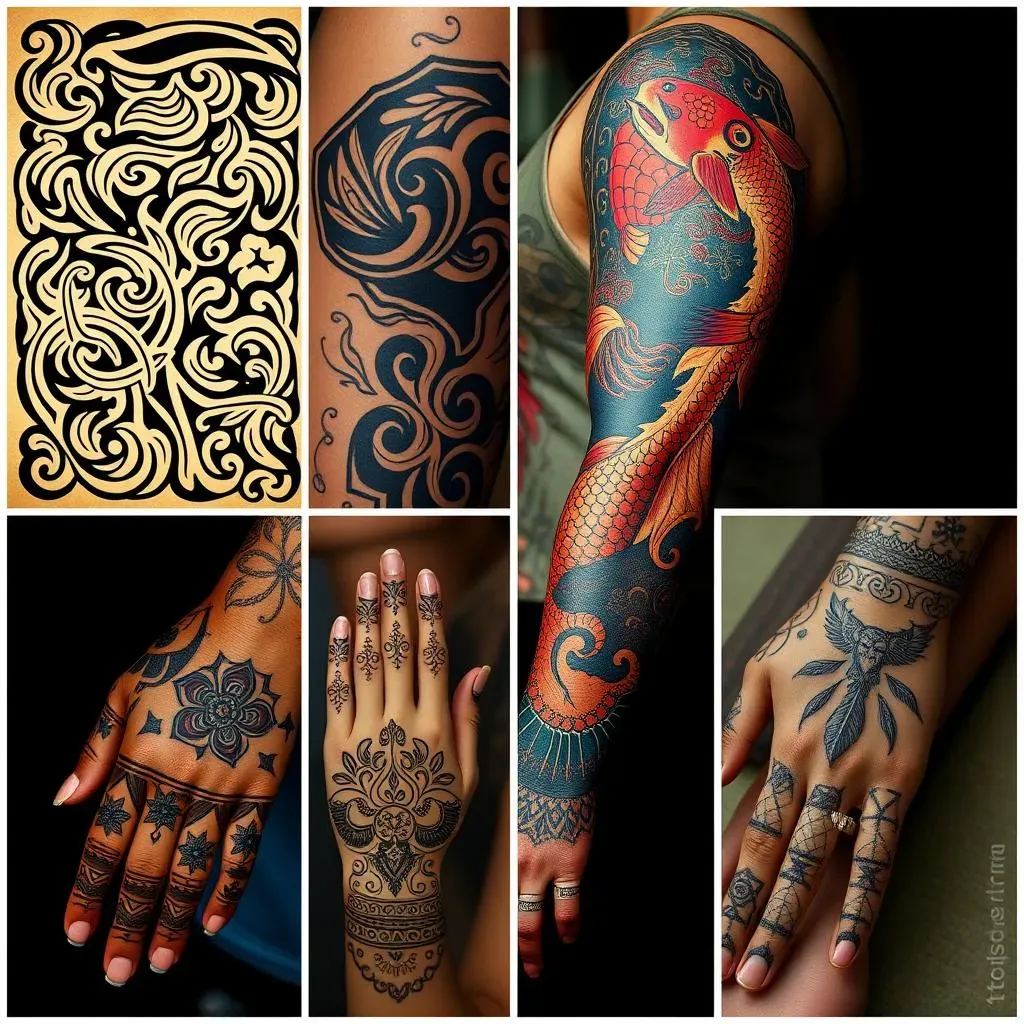
Tribal Tattoos: Heritage and Identity
Let's talk culture! Tattoos aren't just personal statements; they're often deeply rooted in cultural traditions. Take tribal tattoos, for example. These designs aren't just cool patterns; they're visual representations of a tribe's history, beliefs, and social status. From the intricate linework of Polynesian tattoos to the bold designs of Maori Ta Moko, each symbol tells a story of heritage and identity. Getting a tribal tattoo can be a way to honor your ancestry or connect with a specific culture, but it's crucial to do your research and understand the meaning behind the design. You don't want to accidentally misrepresent a culture or appropriate a sacred symbol.
The art of tribal tattooing is often passed down through generations, with specific techniques and designs reserved for certain members of the community. These tattoos can mark significant life events, such as coming of age, marriage, or achieving a certain status within the tribe. They're not just decorative; they're integral to the cultural fabric of the community. So, if you're considering a tribal tattoo, approach it with respect and a genuine desire to learn about its origins.
Japanese Tattoos (Irezumi): Art and Symbolism
Next up, let's journey to Japan! Japanese tattoos, also known as Irezumi, are a true art form, steeped in symbolism and tradition. These aren't your average flash tattoos; they're elaborate, full-body masterpieces that can take years to complete. Each image, from the koi fish swimming upstream to the fierce dragon guarding its treasure, carries a specific meaning. The koi, for instance, represents perseverance and determination, while the dragon symbolizes wisdom and strength. The placement of the tattoo is also significant, with different areas of the body associated with different qualities.
Historically, Irezumi was associated with the Yakuza, the Japanese mafia, but its popularity has spread far beyond that subculture. Today, Japanese tattoos are admired for their artistry and their rich symbolism. However, it's important to be aware of the cultural context and avoid designs that might be considered offensive or disrespectful. For example, certain symbols are reserved for members of the Yakuza and should not be appropriated by outsiders. Do your homework, find a reputable artist who understands the traditions, and embrace the beauty of this ancient art form.
Henna Tattoos: Temporary Art with Cultural Roots
Now, let's switch gears and talk about henna tattoos. Unlike permanent tattoos, henna is a temporary form of body art that has been practiced for centuries in South Asia, the Middle East, and Africa. Henna is made from the leaves of the henna plant, which are ground into a powder and mixed with water to create a paste. This paste is then applied to the skin, staining it a reddish-brown color. Henna tattoos are often used for celebrations, such as weddings and festivals, and are considered a symbol of good luck and prosperity.
The designs themselves can vary widely, from intricate floral patterns to geometric shapes. In some cultures, specific henna designs are believed to have protective powers or to attract good fortune. While henna tattoos are temporary, they hold deep cultural significance and should be approached with respect. If you're considering getting a henna tattoo, learn about the traditions associated with it and choose a design that is appropriate for the occasion.
Culture | Tattoo Style | Symbolism |
|---|---|---|
Polynesian | Intricate linework, geometric patterns | Ancestry, status, protection |
Japanese (Irezumi) | Elaborate, full-body designs | Strength, wisdom, perseverance |
South Asian | Henna, floral patterns, geometric shapes | Celebration, good luck, prosperity |
Native American | Animal motifs, geometric designs | Spirituality, connection to nature |
Choosing the Right Tattoo: Matching Designs with Personal Meanings
Choosing the Right Tattoo: Matching Designs with Personal Meanings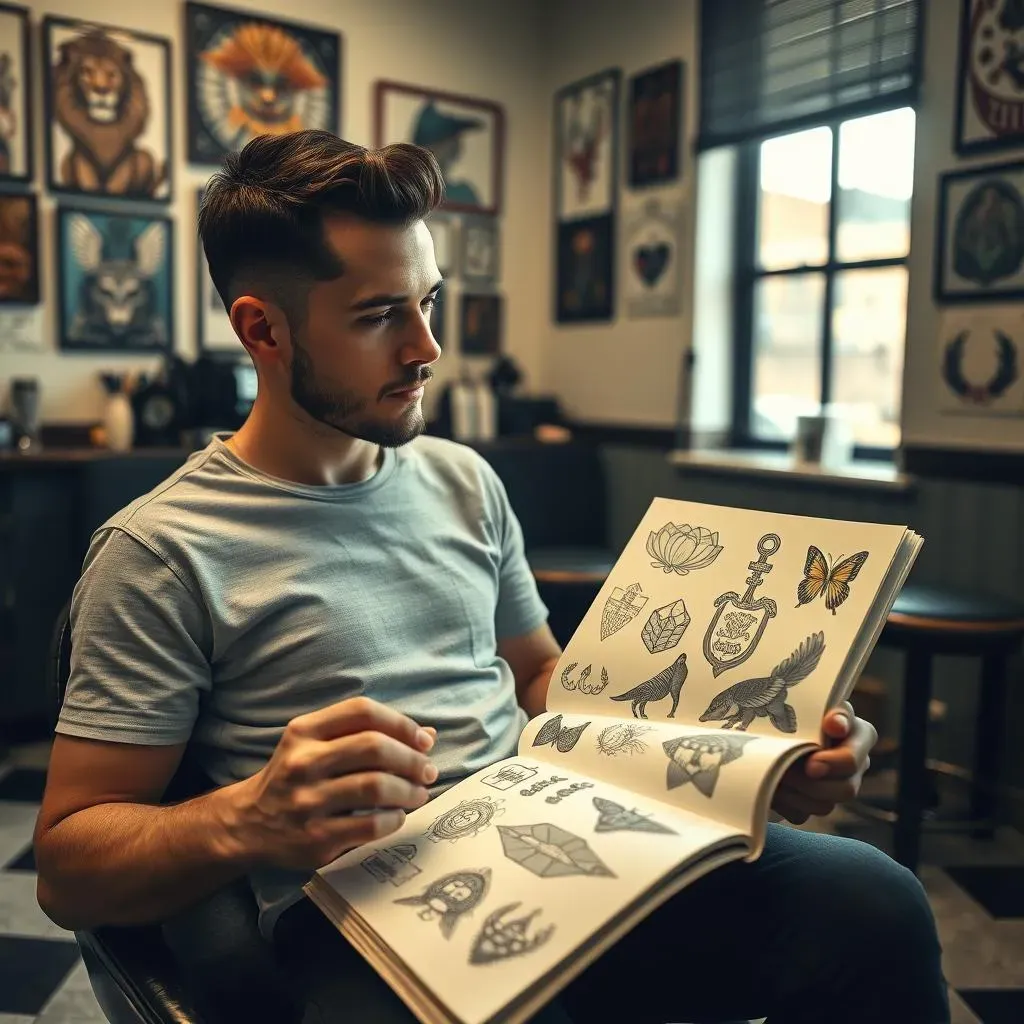
Reflect on Your Personal Story
so you've seen all these amazing designs, right? Lions, lotuses, geometric shapes – it's a lot to take in! But before you rush off to the nearest tattoo parlor, let's take a step back and think about you. What's your story? What are the values that are important to you? What experiences have shaped you into the person you are today? Your tattoo should be a reflection of your unique journey, not just a trendy design you saw on Instagram.
Think about symbols, animals, or concepts that resonate with you on a personal level. Maybe you've always been drawn to the ocean, so an anchor or a wave tattoo might be a good fit. Perhaps you've overcome a difficult challenge, making a butterfly or a phoenix a meaningful choice. Or maybe you simply want to honor your family, so a wolf or a family crest could be a powerful symbol. The key is to choose a design that speaks to your soul and tells a story that is authentic to you.
Consider the Placement and Size
Once you've got a design in mind, it's time to think about placement and size. Where on your body do you want to get inked? A small, delicate design might look great on your wrist or ankle, while a larger, more intricate tattoo might be better suited for your back or thigh. Consider your lifestyle and your profession. Will your tattoo be visible at work? Are you comfortable showing it off, or do you prefer to keep it hidden?
The size of your tattoo will also impact its visibility and its overall impact. A tiny tattoo can be a subtle reminder of something important, while a large tattoo can be a bold statement. Think about the level of commitment you're willing to make and choose a size that feels right for you. And don't forget to factor in the artist's expertise! Some artists specialize in small, detailed tattoos, while others are better suited for large-scale work. Do your research and find an artist who can bring your vision to life.
Research the Artist and Their Style
This is HUGE. Seriously, don't skip this step. Not all tattoo artists are created equal. Each artist has their own unique style and expertise. Some specialize in traditional tattoos, while others excel at watercolor or geometric designs. Before you book an appointment, take the time to research different artists in your area and check out their portfolios. Do you like their style? Do they have experience with the type of tattoo you want? Do they have good reviews?
A good tattoo artist will not only have the technical skills to create a beautiful tattoo, but they'll also be able to offer guidance and advice. They can help you refine your design, choose the right placement, and ensure that your tattoo will age well over time. Don't be afraid to ask questions and voice your concerns. This is your body, and you want to make sure you're working with someone you trust. A little research can go a long way in ensuring that you end up with a tattoo you'll love for years to come.
Factor | Considerations |
|---|---|
Personal Story | Values, experiences, beliefs |
Placement | Visibility, lifestyle, profession |
Size | Subtlety, boldness, artist expertise |
Artist Style | Specialization, portfolio, reviews |
Conclusion: Inked with Intention
Choosing a tattoo is a deeply personal journey, one that blends artistry with self-expression. As you've explored the diverse world of tattoo designs and meanings, it's clear that each symbol, animal, and abstract form carries its own unique weight and significance. The key is to find a design that not only appeals to your aesthetic sense but also resonates with your inner self, reflecting your values, experiences, and aspirations. Whether you opt for a bold statement piece or a subtle, hidden emblem, let your tattoo be a testament to your individuality, a permanent reminder of the story you want to tell the world. So, go forth and get inked with intention, knowing that your tattoo is more than just skin deep—it's a reflection of who you are.